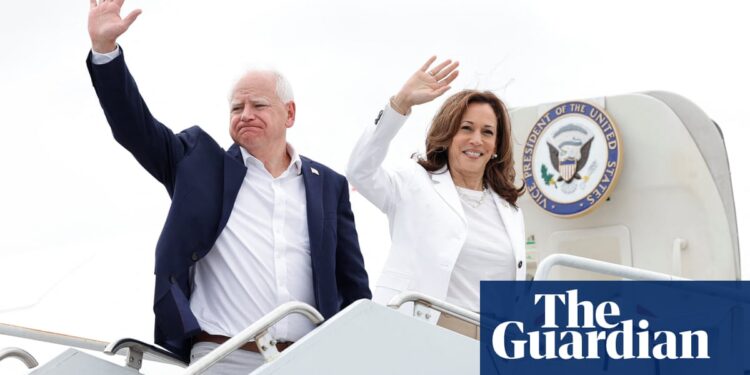Kamala Harris and Tim Walz will sit for their first interview as the Democratic ticket on Thursday, after weeks of demands from Republicans and members of the media for the nominees to open themselves up to questions.
The interview, which will be conducted by CNN anchor Dana Bash from the battleground state of Georgia, is set for a primetime spot on CNN at 9pm ET.
Despite a whirlwind of media coverage of the Harris campaign and a surge of support in the six weeks since Joe Biden ended his bid for re-election and endorsed her, the vice-president has yet to do a formal interview or hold a press conference.
“There are a lot of questions that have been lingering out there for her to answer as we go into this fall campaign,” David Chalian, CNN’s political director, said after announcing the interview on the network Tuesday. “We have been waiting to see this next important hurdle for Kamala Harris and her campaign to jump,” Chalian added, noting that Harris and Walz successfully rallied the party, raised heaps of money, and pulled off the convention. “All of that is very scripted,” he said. “This is the first time she is going to take questions.”
Harris laid out some broad policy agendas at the Democratic national convention last week, promising a middle class tax cut at home and a muscular foreign policy of standing up to Russia and North Korea. In recent weeks, Harris also shared some of the first glimpses into what her policy priorities might look like, including a proposal for $25,000 down-payment support programs for first-time home buyers and a call for cracking down on price-gouging companies.
But while her campaign is busy spreading enthusiasm for her nomination, some details have been left scant. There still isn’t a dedicated policy page on the official campaign website and Harris has turned down interview requests, opting instead for less-risky campaign appearances and short conversations with pool reporters.
“On the whole, Harris’s top communications aides are deeply skeptical, as Biden’s inner circle was, that doing big interviews with major TV networks or national newspapers offer much real upside when it comes to reaching swing voters,” Politico reported earlier this month, citing two unnamed people close to the campaign. An anonymous source claimed there is little incentive to change course: “She’s getting out exactly the message she wants to get out,” they said.
Now, as time ticks down for Harris and Walz, the governor of Minnesota, to make their final appeal to anyone who might still be undecided, their campaign has embraced a slight shift in strategy.
Harris and her opponent, Donald Trump, are scheduled to debate each other next month, even as a back-and-forth continues between the campaigns over what rules have been agreed.
The dispute has centered on the issue of microphone muting, which Biden’s campaign made a condition of his decision to accept any debates this year. Trump said in a post on Truth Social on Tuesday that the parameters for the 10 September debate would be “the same as the last CNN Debate”, when both candidates’ microphones were muted except when it was their turn to speak.
But Harris’s campaign said on Tuesday that specifics for the debate are still being worked out with the host, ABC News. A Harris spokesperson noted: “Both candidates have publicly made clear their willingness to debate with unmuted mics for the duration of the debate to fully allow for substantive exchanges between the candidates – but it appears Donald Trump is letting his handlers overrule him. Sad!”
after newsletter promotion
Meanwhile, the Democratic ticket will make good on its promise to do an interview.
“Now is the opportunity to hear her ruminate aloud,” Chalian said, “with Dana asking her about her policy positions, her plans for the future, her plans for the country, in an unscripted setting – and, of course, to see the Democratic ticket interacting with each other.”
The Associated Press and Reuters contributed to this story







